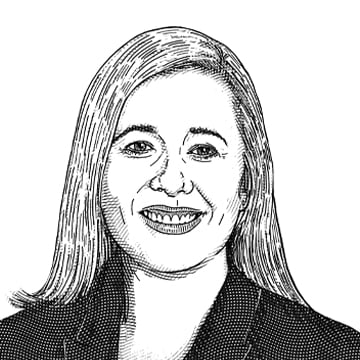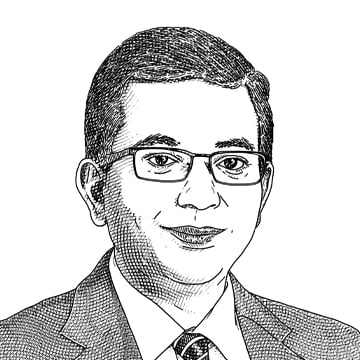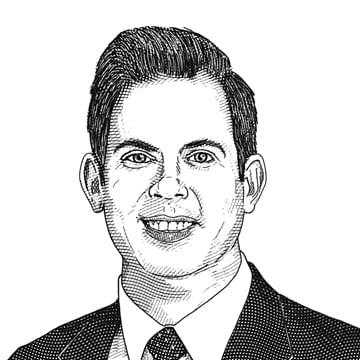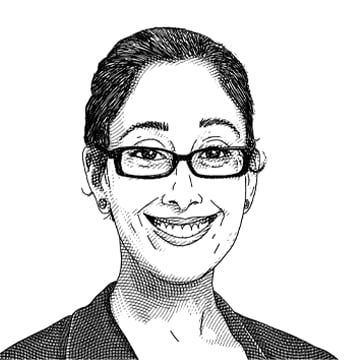KEY TOPIC
You'll Wear It Well
Going forward, what role do you foresee for wearable devices in cardiovascular health?
Edited by John Soeder
Illustrations: Ken Kula

Christine Jellis, MD, PhD
Christine Jellis, MD, PhD
Wearables are expected to play a significant role in the future management of cardiovascular health. Continuous data will allow for real-time tracking of multiple parameters, which will enable early detection of abnormalities for timely diagnosis of new issues, along with monitoring those with existing cardiovascular conditions, allowing for proactive remote management and reducing the need for frequent in-person visits. Wearables will provide personalized insights into heart health, which will better empower people to make more informed choices to improve their cardiovascular fitness. Wearable data will also make innovative large-scale, population-based research into cardiovascular health more broadly available.
Dr. Jellis is Vice Chair of the Sydell and Arnold Miller Family Heart, Vascular & Thoracic Institute.
Hometown: Melbourne, Australia
First job: Barista in a coffee shop while I was in medical school
Undergraduate education: Monash University (Melbourne, Australia)
Currently reading: All the Light We Cannot See by Anthony Doerr
Pastime pleasure: Spending time with family and friends; travelling; reading; gardening

Samir Kapadia, MD
Samir Kapadia, MD
Wearable devices are going to be very important for both primary prevention and monitoring of different cardiac diseases. This will range from electrocardiogram-related information — with several AI algorithms to rapidly diagnose problems and appropriately alert healthcare providers and patients — to monitoring of hemodynamics (how blood flows through arteries and veins). The development of appropriate infrastructure in the healthcare delivery systems to handle these data integrations will be key to the success of wearable devices.
Dr. Kapadia is Chair of the Robert and Suzanne Tomsich Department of Cardiovascular Medicine. He holds the Jennifer and Robert McNeil Endowed Chair in Interventional Cardiology.
Undergraduate education: Gujarat University (Ahmedabad, India)
Pastime pleasure: Astronomy

Nicholas Ruthmann, MD, MPH
Nicholas Ruthmann, MD, MPH
Wearables are disrupting more traditional ways that we manage and monitor heart health. These devices are accessible, provide vast amounts of individualized data and increase patient health engagement. With further innovations in digital technology and improved reliability of data, wearables will become more scalable and ubiquitous, and they’re projected to save billions of dollars for healthcare systems and patients globally. Through judicious research and application of these novel tools, wearables will provide extensive opportunities to evolve and improve how we diagnose and treat cardiac disease. Our focus at Cleveland Clinic is to help lead this disruption, innovate in the cardiac wearable space, create disciplined strategies around appropriate use and facilitate the integration of wearables to improve patient outcomes.
Dr. Ruthmann is Director of Digital Health for the Sydell and Arnold Miller Family Heart, Vascular & Thoracic Institute.
Hometown: Butler, Missouri
First job: Waiter for my mom’s catering business
Undergraduate education: University of Missouri
Currently reading: Rereading The Pillars of the Earth by Ken Follett
Pastime pleasure: Collecting vintage watches

Tamanna Singh, MD, FACC
Tamanna Singh, MD, FACC
As a sports cardiologist, I find that wearable devices among my athlete-patients are incredibly helpful in providing direct insight into fitness tracking and symptom correlation to measurable factors such as heart rate, heart rate variability, cardiac rhythm and more. These devices provide longitudinal information and insight into health trends, which is more helpful for screening, diagnostics and counseling than a finite data point obtained from a single office visit. Moving forward, I’m excited to see how wearable technology will advance to incorporate cardiovascular disease detection and even cardiovascular event prediction, as these innovations have the potential to significantly reduce the rising costs of healthcare.
Dr. Singh is Co-Director of the Sports Cardiology Center.
Hometown: Northbrook, Illinois
First job: Assistant in Student Activities Office at Boston University
Undergraduate education: Boston University
Currently reading: Up to Speed by Christine Yu
Pastime pleasure: Running and playing with our four dogs
